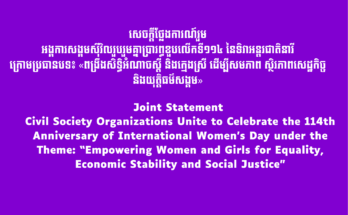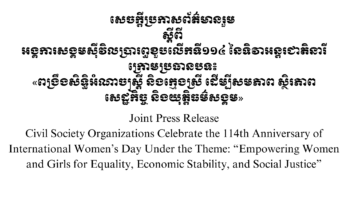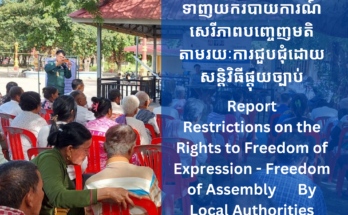ADHOC – KRT Cambodia: Nationwide Civil Party Representative Scheme
Since the establishment of the ECCC, the Cambodian Human Rights and Development Association (ADHOC) has been actively involved in the unique victims’ participation scheme of the Court. While the first project focused mostly on outreach activities for the Cambodian population, the second one centers entirely on assuring a meaningful Civil Party participation in the proceedings in Case 002.
 The experiences made in working with the Civil Parties in Case 001 were adopted for Case 002. However, in contrast to the small number of Civil Parties in Case 001 of only 93, ADHOC is currently assisting 1058 out of 2123 admitted Civil Parties throughout Cambodia. These high numbers bring about new challenges to a meaningful and feasible participation. To overcome these obstacles ADHOC has established a nationwide Civil Party Representatives (CPR) Scheme. The 122 Representatives act as Communicators and Messengers to strengthen the communication channels between ADHOC, lawyers, the ECCC and other Civil Parties. Furthermore, several rounds of Civil Party District meetings will be held for the Civil Parties. In January 2011, ADHOC started the first round of around 40 Civil Party District meetings which update and inform the Civil Parties about the current developments at the ECCC, particularly Case 002.
The experiences made in working with the Civil Parties in Case 001 were adopted for Case 002. However, in contrast to the small number of Civil Parties in Case 001 of only 93, ADHOC is currently assisting 1058 out of 2123 admitted Civil Parties throughout Cambodia. These high numbers bring about new challenges to a meaningful and feasible participation. To overcome these obstacles ADHOC has established a nationwide Civil Party Representatives (CPR) Scheme. The 122 Representatives act as Communicators and Messengers to strengthen the communication channels between ADHOC, lawyers, the ECCC and other Civil Parties. Furthermore, several rounds of Civil Party District meetings will be held for the Civil Parties. In January 2011, ADHOC started the first round of around 40 Civil Party District meetings which update and inform the Civil Parties about the current developments at the ECCC, particularly Case 002.The Representatives are at the interface between Civil Parties, ADHOC and the court and a contact point for them to address their questions about the progress of the trial, how to contact their lawyers etc.
Strengthening the CPR scheme is imperative in order to adequately deal with the high number of Civil Parties in Case 002 and guarantee that they are well informed and able to actively participate in the proceedings.
One of the trainings was recently conducted in Phnom Penh. All 122 Representatives attended the two day meeting where different representatives of the ECCC and other stakeholders were gave a coherent overview of Case 001 and Case 002 and the challenges the ECCC is confronted with.
Co-Prosecutor Andrew Cayley informed the participants about the precarious financial situation and the tight time frame of the court. His colleague Deputy Co-Prosecutor Chan Darasmay gave insights into the progress of the work of the prosecution unit and emphasized the importance of the representative system in keeping the Civil Parties updated and involved in the proceedings. Among the panelist were representatives from GIZ, OSJI, OHCHR, CDP, VOA, VSS and Lead Co-Lawyers and many civil party lawyers.
The second day was structured entirely with specific training modules, from an overview of the different ECCC organs, to the VSS mandate of non-judicial measures and psychological support for Civil Parties and victims.
Strengthening the capacities of the Civil Party Representatives to enable them to provide an effective communication channel is an important step to ensure a meaningful participation of a large number of Civil Parties and could set a precedent in the work of international criminal tribunals working with large numbers of victims. It can help to bridge the existing gap between victims and the tribunals.



